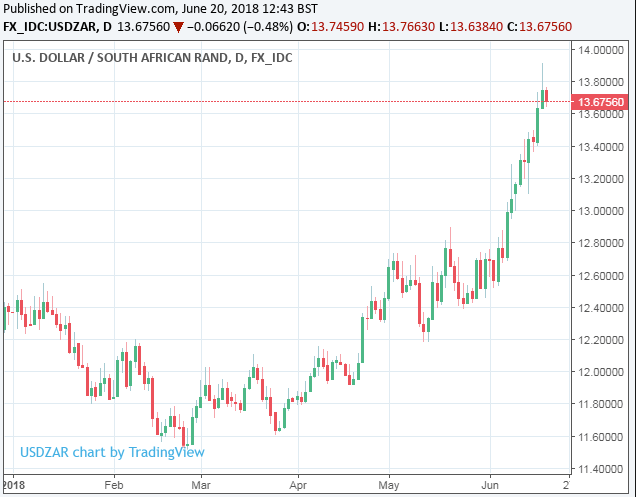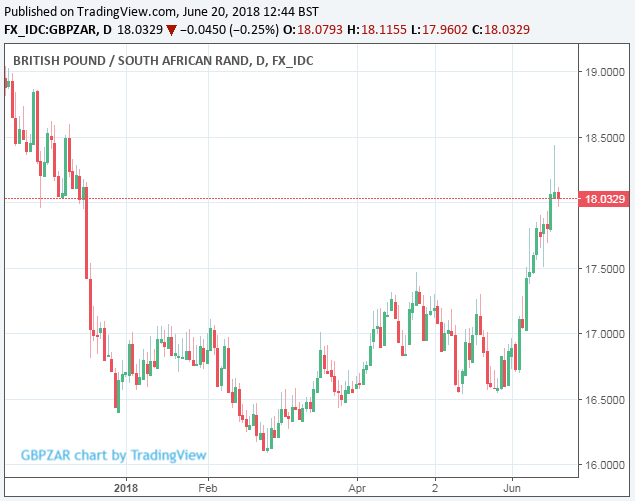South African Rand Rises as Markets Eye Acceleration in Inflation Over Coming Months
- Written by: James Skinner
- ZAR rises as inflation falls and concerns over trade wars ease.
- Economists warn inflation pressures to rise in months ahead.
- SARB may have to raise rates in order to stave off ZAR depreciation.

Johannesburg, South Africa, Image © Adobe Stock
The Rand rose Wednesday amidst a broad recovery in emerging market currencies thanks to a temporary easing of the trade war tensions that have beset global market over recent days.
However, domestic data was also on tap with official data showing inflation posted a surprise fall during the month of May; but economists are warning that recent currency depreciation could easily push domestic price pressures higher in the months ahead, posing a challenge to the South African Reserve Bank which will likely have to raise interest rates further.
South African inflation rose by just 0.2% in May, taking the annual rise in consumer prices down from 4.5% to 4.4%, when markets had been looking for an increase to 4.6%.
But markets are clearly looking through the current soft-patch in inflation and expecting price rises to accelerate.
"The measure of underlying (core) inflation, CPI excluding food and non-alcoholic beverages, fuel and energy prices, also fell to 4.4% y/y in May, from 4.5% in April, in line with the headline outcome," says Lara Hodes, an economist at Investec Bank. "We estimate that the long-term structural inflation rate in SA is around 5.5% y/y and continue to forecast a 25bp hike in the repo rate in January 2019, another in March 2019 and a further 25bp lift in 2020 in order to return SA interest rates to neutral levels."
Economists and analysts are increasingly warning that South Africa's inflation rates could rise sharply in the months ahead, given that the currency has fallen by 10% against the Dollar and by similar degrees against the Pound and Euro in 2018.
This has made imported goods more expensive for South African companies and consumers to buy. Oil prices are also playing their part, after rising by more than 10% this year.
"The weak Rand and elevated oil prices are making the SARB worry about inflation, it’s going to be all about the exchange rate pass-though and second-round effects as domestic demand remains muted. If the inflation figures out today meet our expectation and the current account deficit tomorrow hits 5.0% of GDP, USD/ZAR is likely to breach 14.00. It opens at 13.72 this morning, down from a high of 13.91 yesterday," says Isaah Mhlanga, an economist at Rand Merchant Bank.
Wednesday's inflation number comes a day ahead of the first-quarter current account data, due for release on Thursday, which is expected to show outflows of funds from South Africa intensifying during the period as companies and consumers likely spent more Rand on energy, food and other products over recent months.
Buying goods on the international market means selling the Rand and buying foreign currencies. If the Rand has weakened against those foreign currencies, then more of it has to be sold than otherwise would have.

Above: USD/ZAR rate shown at daily intervals.
The USD/ZAR rate was quoted 0.28% lower at 13.68 following the release Wednesday while the Pound-to-Rand rate was down 0.41% at 18.00. South Africa's currency also traded higher against most other developed world currencies as the sell-off in emerging markets, with the exception of Turkish assets, appeared to pause on Wednesday.

Above: Pound-to-Rand rate shown at daily intervals.
"The Rand is caught in the crossfire as we have little to offer. Growth is weak, the SARB cut rates in March and remains on hold while other emerging market central banks bolster their attractiveness by hiking rates, although for country-specific reasons, but the fact is that they are hiking. This leaves the rand as vulnerable as taking a naked summer swim with jelly fish," Mhlanga adds.
Emerging market currencies have been hit hard in recent months by two equally powerful forces. The Federal Reserve and its steady march toward balance sheet normalisation has sapped US Dollar liquidity from global markets, placing emerging market currencies under pressure even as their central banks raise interest rates. And the recent escalation of concerns about a so called trade war between the US and China is also now playing its part too.
"If second round effects of ZAR depreciation are beginning to emerge for inflation the SARB will (have to) take action," says Esther Reichelt, an analyst at Commerzbank. "The likelihood of this has risen most recently as there is a risk that the South African economy could very quickly be adversely affected in case of an escalating trade war, as China is South Africa’s most important trade partner."
Reichelt and the Commerzbank team say that sentiment toward South African assets, including the Rand, could be badly damaged if expectations for Chinese economic growth are downgraded in the wake of the recent spat between the world's two largest economies.
President Donald Trump instructed US trade representatives on Monday to begin preparing a 10% tariff on imports of more than $200 billion in Chinese goods, which has already drawn a threat of retaliation from China's Ministry of Commerce and may have far-reaching implications for US inflation, economic growth, interest rates and the Dollar.
This followed Friday's decision by the White House to push ahead with $50 billion of tariffs on Chinese technology goods. Fears are that the tit-for-tat tariff fight will dent economic growth in the US and China, which will have spillover effects for economies elsewhere in the world, but particularly the South African economy.
Advertisement
Get up to 5% more foreign exchange by using a specialist provider to get closer to the real market rate and avoid the gaping spreads charged by your bank when providing currency. Learn more here




